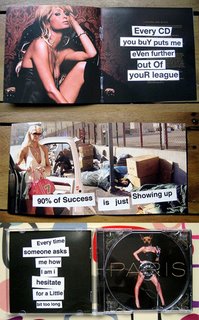Dress Up Jesus For Christmas

Proud winner of wired magazine's "most ignored blog on the internet" award. Mostly links from a self-professed "kulcher" addict.



 Guerilla graffiti artist and notorious prankster, Banksy, may have just pulled off his masterpiece. Last week he allegedly smuggled some 500 copies of an “altered version” of the new CD from America’s favorite waste of skin, Paris Hilton, into half a dozen UK record stores. The Banksy version had altered artwork from the original sleeve and the musical contents of the CD are said to be a 40 minute remix rumored to be the work of Danger Mouse. The Banksy art includes a photo of Paris emerging from a limo (with homeless people added in the background) and one photo with the head of a dog superimposed over her image. All copies have been pulled from the record stores and customers are not allowed to purchase them. As of this writing, Banksy versions are going in the $500-600 range on eBay. You can visit Banksy’s excellent website here.
Guerilla graffiti artist and notorious prankster, Banksy, may have just pulled off his masterpiece. Last week he allegedly smuggled some 500 copies of an “altered version” of the new CD from America’s favorite waste of skin, Paris Hilton, into half a dozen UK record stores. The Banksy version had altered artwork from the original sleeve and the musical contents of the CD are said to be a 40 minute remix rumored to be the work of Danger Mouse. The Banksy art includes a photo of Paris emerging from a limo (with homeless people added in the background) and one photo with the head of a dog superimposed over her image. All copies have been pulled from the record stores and customers are not allowed to purchase them. As of this writing, Banksy versions are going in the $500-600 range on eBay. You can visit Banksy’s excellent website here.

As you know, I almost never reach out to you personally with a request to get involved in a debate in the U.S. Congress. However, today I feel I must.
Right now, the telephone and cable companies in control of Internet access are trying to use their enormous political muscle to dramatically change the Internet. It might be hard to believe, but lawmakers in Washington are seriously debating whether consumers should be free to use the Internet as they want in the future.
The phone and cable companies now control more than 95% of all Internet access. These large corporations are spending millions of dollars to promote legislation that would allow them to divide the Internet into a two-tiered system.
The top tier would be a "Pay-to-Play" high-speed toll-road restricted to only the largest companies that can afford to pay high fees for preferential access to the Net.
The bottom tier -- the slow lane -- would be what is left for everyone else. If the fast lane is the information "super-highway," the slow lane will operate more like a dirt road.
Today's Internet is an incredible open marketplace for goods, services, information and ideas. We can't give that up. A two-lane system will restrict innovation because start-ups and small companies -- the companies that can't afford the high fees -- will be unable to succeed, and we'll lose out on the jobs, creativity and inspiration that come with them.
The power belongs with Internet users, not the big phone and cable companies. Let's use that power to send as many messages as possible to our elected officials in Washington.